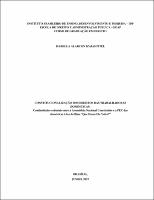Use este identificador para citar ou linkar para este item:
https://repositorio.idp.edu.br//handle/123456789/3940| Título: | Constitucionalização dos direitos das trabalhadoras domésticas: continuidades coloniais entre a Assembleia Nacional Constituinte e a PEC das domésticas à luz do filme “Que Horas Ela Volta?” |
| Autor(es): | Pitel, Isabella Alarcon Izaias |
| Orientador(es): | Queiroz, Marcos Vinícius Lustosa |
| Palavras-chave: | Trabalhadoras domésticas;Constituição Federal;Sindicato das trabalhadoras doméstica;Direitos sociais;Direito Constitucional do Trabalho |
| Data de submissão: | 2022 |
| Editor: | IDP/EAB |
| Citação: | PITEL, Isabella Alarcon Izaias. Constitucionalização dos direitos das trabalhadoras domésticas: continuidades coloniais entre a Assembleia Nacional Constituinte e a PEC das domésticas à luz do filme “Que Horas Ela Volta?”. 2022. 65 f. Trabalho de Conclusão de Curso (Graduação em direito) - Instituto Brasileiro de Ensino, Desenvolvimento e Pesquisa, Brasília, 2022. |
| Resumo: | O objetivo da pesquisa é refletir em que medida a constitucionalização dos direitos das trabalhadoras
domésticas é efetiva e suficiente para romper a lógica existente antes de sua normatização. Assim,
indaga-se fundamentalmente sobre quem se beneficia com a precariedade do trabalho doméstico e por
quais motivos a regulamentação desse trabalho foi efetivada somente em 2013. Sabe-se que o sindicato
das trabalhadoras domésticas esteve presente durante a Assembleia Nacional Constituinte, inclusive, as
sindicalizadas acampavam na frente do Congresso Nacional quando não tinham para onde ir. Dito isso,
questiona-se de que maneira as relações sociais paternalistas trabalhadora doméstica-patrão se
modificaram entre a Assembleia Nacional Constituinte e a PEC das domésticas. Ademais, são
investigadas as repercussões da normatização dos direitos das domésticas no imaginário social e político
brasileiro. Utilizou-se o filme brasileiro “Que Horas Ela Volta?”, o qual aborda as desigualdades sociaissistemáticas no país e a continuidade da lógica escravocrata, a partir da relação de submissão da
trabalhadora doméstica e seus patrões. |
| Abstract: | The aim of this research is to reflect on the extent to which the constitutionalization of domestic workers' rights is effective and sufficient to break with the logic that existed before its regulation. Thus, the fundamental question is who benefits from the precariousness of domestic work and why the regulation of this work was only effective in 2013. It is known that the domestic workers union was present during the National Constituent Assembly, including the union members camping in front of the National Congress when they had nowhere else to go. We question how the paternalistic social relations domestic worker-boss have changed between the National Constituent Assembly and the Proposal of Constitutional Amendment of domestic workers. Furthermore, we investigate the repercussions of the normatization of the rights of domestic workers in the Brazilian social and political imaginary. The Brazilian film "Que Horas Ela Volta?" was used, which addresses the social-systematic inequalities in the country and the continuity of the slave logic, based on the relationship of submission of domestic workers and their employers. |
| URI: | https://repositorio.idp.edu.br//handle/123456789/3940 |
| Aparece nas coleções: | Trabalhos de Conclusão de Curso (Graduação) |
Arquivos associados a este item:
| Arquivo | Descrição | Tamanho | Formato | |
|---|---|---|---|---|
| TCC_ISABELLA ALARCON IZAIAS PITEL_GRADUAÇÃO EM DIREITO.pdf | 797.18 kB | Adobe PDF |  Visualizar/Abrir |
Os itens no repositório estão protegidos por copyright, com todos os direitos reservados, salvo quando é indicado o contrário.
